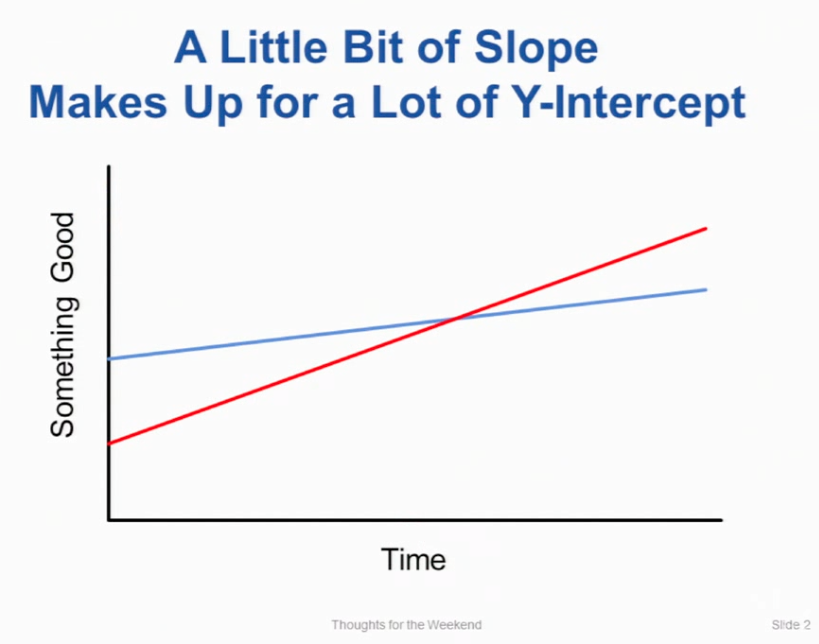A little bit of slope makes up for a lot of Y-intercept
(by John Ousterhout)Here's some food for thought for the weekend. "The tilt angle is more important than the y-intercept."
[laughter]

Mathematically, that's a commonplace. If there are two straight lines, red and blue, and red crosses the Y-axis lower than blue, but has a greater angle of inclination, then in the end, red crosses blue.
If we plot something good along the Y axis, depending on how we define “good,” then most people would choose the red rather than the blue trajectory (the main thing is not to grow old and not die before the intersection point).
[laugh]
It may be corny in terms of mathematics, but it can be a good guide to life. How quickly you learn is much more important than how much you know from the beginning. People overestimate how much they know, but what really matters is how quickly they learn.
This is good news for all of you because you are at Stanford and it means that you have to learn very, very quickly. This is your great advantage. Now let me give you some examples. First example: you shouldn't be afraid to try something new, even if you know absolutely nothing about the area you are entering. There is no need to be afraid of this. As long as you learn quickly, you will catch up and be fine.
For example, I often hear conversations in the first week of class in which someone whines, "oh, so and so knows a lot about blah blah blah, how am I ever going to catch up with them?" Well, if you are one of those people who know about blah blah blah then this is bad news for you because honestly everyone will catch up very quickly. Before you know it, that advantage will disappear, and if you don't learn too, you will be behind.
Another example is that many people get stuck in the rut of their lives. They understand that they are working in the wrong place. I have the wrong job or the wrong spouse or whatever ...
[laughter]
And they're afraid to leave and try something new. They often worry that I will really look bad if I leave ...
[laughter]
I'm kidding about my spouse. But seriously, people will be afraid to try new things because they are afraid they will look bad or make a lot of newbie mistakes. But, I say, just go and focus on your studies.
[laughter]
Let me take the spouse out of the equation for now.
[laughter]
Let's focus on the action.
Another example is hiring staff. Before returning to the academic environment a couple of years ago, I was involved in startups. I've noticed that when people are hiring workers, they almost always hire based on experience. They are looking for someone's resume, trying to find someone who has already done the job they want them to do three times. This is basically a "Y-Intercept" hiring.
Personally, I don't think this is a very good way to hire. People who do the same thing over and over often burn out, and usually the reason they do the same thing over and over is because they've exhausted themselves. There is nothing more they can do. And in fact, generally, what happens when you stabilize is that you stabilize a little above your level of competence. So you are not really doing very well with the current job.
Therefore, what I always hire is based on ability, not experience. Is this person ready to do their job? They may have never done this before and have no experience in the field, but are they smart people who can figure things out? Are they quick to learn? And I've found that this is a much better way to reach really effective people.
I think this is a really interesting concept that you can apply in different fields. And the most important thing here, I think slow and steady is great. You don't have to do anything heroic. You know the difference in incline doesn't have to be that big if you just think every day about learning a little more and getting a little better, taking a lot of small steps, it's amazing how quickly you can catch up and become a real expert at this area.
I often ask myself: have I learned anything new today? You guys are younger and you know your tilt angle is slightly larger than mine, so you can learn 2, 3, or 4 new things a day. But if you just think about your tilt angle and don't worry about where you start, you will end up in some good place.
Okay, think about it over the weekend.
[applause]